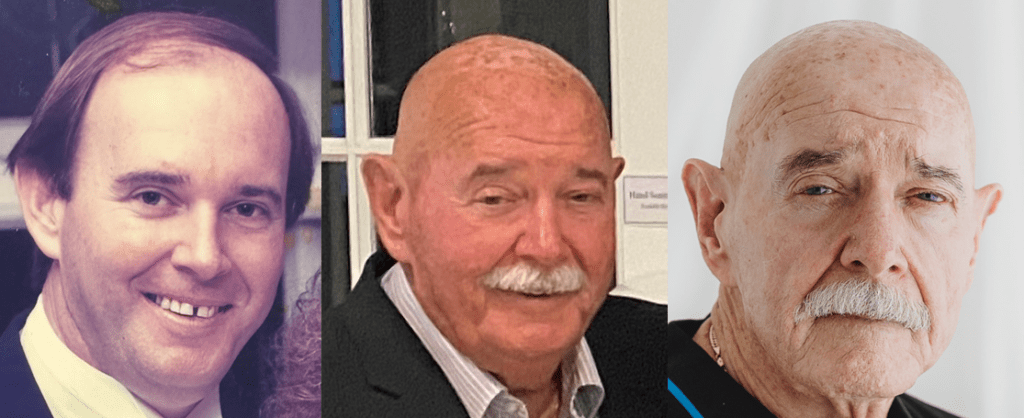Do You Want To Live Forever selected eight people to participate in a program that examined their biological age before and after participating in a 12-week experiment?
At the beginning of the program, the biological age of all but one participant was already higher than their actual age.
Twelve weeks later, five participants had reduced their biological age to less than their actual age, two had reduced it to their physical age, and one was one year higher than their physical age. The group achieved a 20% reduction in biological age and 5.6% lower than their actual age.

These three photographs were taken in 1987, when I was 39, in 2020, when I was 72, and in 2024, when I was 76, with a Biological age of 73.
A biological age higher than your chronological age can have several significant consequences for an individual’s health and well-being. What are those risks?
Increased risk of age-related diseases, higher mortality risk, reduced physical function, cognitive decline, shortened health span, increased healthcare burden, and potential impact on quality of life are all associated with higher biological age.
Research shows that individuals with a higher biological age are more susceptible to cardiovascular disease, diabetes, cancer, lung diseases, dementia, and Alzheimer’s, as well as a higher risk of premature mortality, decreased physical capabilities, cognitive impairments, and a shorter period of life free from health issues and functional limitations.
Genetics, environmental factors, and lifestyle choices like diet, exercise, stress management, sleep, and social connections all affect biological aging. Individuals can improve their health outcomes and quality of life by lifestyle changes to slow aging.
Ongoing research in longevity aims to develop more accurate methods to measure biological age and identify interventions to delay or reverse the aging process. This offers hope for extending health span and enhancing overall well-being.
The latest research findings show that incorporating specific lifestyle changes can significantly delay biological aging. Following the essential guidelines, which include getting enough sleep, abstaining from smoking, engaging in regular physical activity, and maintaining a healthy diet, can all contribute to slowing down the aging process.
Improving your diet by consuming nutrient-rich foods like dark leafy greens, cruciferous vegetables, and seeds while reducing processed foods and added sugars can positively impact aging. Additionally, incorporating stress management techniques, enhancing social connections, staying hydrated, and considering intermittent fasting or time-restricted feeding can also play a crucial role in slowing down biological aging.
Supplementing wisely with probiotics and phytonutrients, prioritizing DNA methylation support, and managing chronic stress are essential steps. Research suggests that by following these lifestyle changes, individuals can lower their biological age by up to 5-6 years compared to their chronological age.
There are 30 known vitamins and minerals, plus 11 additional compounds, that could play a role in longevity by supporting vital “longevity proteins” in the body. These proteins help shield against cellular damage and age-related ailments. They are Vitamin A, Vitamin B1 (Thiamine), Vitamin B2 (Riboflavin), Vitamin B3 (Niacin), Vitamin B5 (Pantothenic acid), Vitamin B6 (Pyridoxine), Vitamin B7 (Biotin), Vitamin B9 (Folate), Vitamin B12 (Cobalamin), Vitamin C, Vitamin D, Vitamin E, Vitamin K, Choline, Calcium, Chloride, Chromium, Cobalt, Copper, Iodine, Iron, Magnesium, Manganese, Molybdenum, Phosphorus, Potassium, Selenium, Sodium, Sulfur, and Zinc.
While these nutrients offer exciting potential for healthy aging, further research is crucial to grasp their full impact on longevity. Don’t underscore the significance of obtaining these nutrients through a well-rounded, nutrient-dense diet rather than relying solely on supplements.
While genetics play a role in aging, lifestyle factors significantly influence and can be adjusted to positively impact biological age. By making these adjustments, individuals can take proactive steps towards a healthier and potentially longer life. Let’s embrace these changes to age gracefully and healthily.
You may not want to live forever, but I guarantee you will eventually want to.
It’s time to make changes before they become impossible or the benefit is significant.
